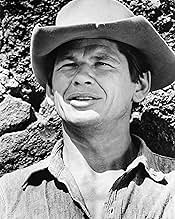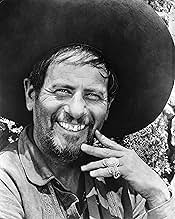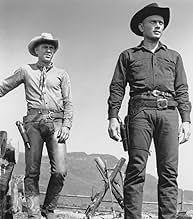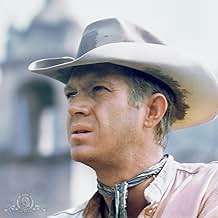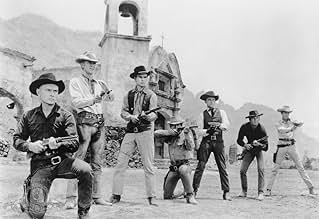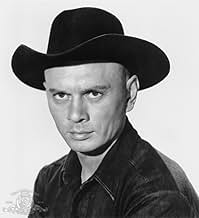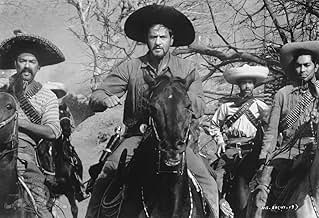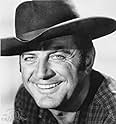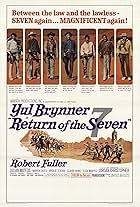Sete pistoleiros são contratados por mexicanos para libertar sua aldeia dos bandidos opressores.Sete pistoleiros são contratados por mexicanos para libertar sua aldeia dos bandidos opressores.Sete pistoleiros são contratados por mexicanos para libertar sua aldeia dos bandidos opressores.
- Direção
- Roteiristas
- Artistas
- Indicado a 1 Oscar
- 2 vitórias e 6 indicações no total
Jorge Martínez de Hoyos
- Hilario
- (as Jorge Martinez de Hoyas)
Natividad Vacío
- Villager
- (as Natividad Vacio)
John A. Alonzo
- Miguel
- (as John Alonso)
Resumo
Reviewers say 'The Magnificent Seven' has a strong cast, including Yul Brynner and Steve McQueen, and an iconic score. But it's seen as less profound and more formulaic than 'Seven Samurai', which it's a remake of. The Western setting and Hollywood production style differentiate it from the more culturally specific and artistically driven original.
Avaliações em destaque
I've seen both the American and Japanese versions many times, and while everyone agrees about which one is better, the American version has some virtues: 1) Our heroes are selected by the farmers when they defend a dead Indian's right to be buried in the same place as white people; therefore they are seen as champions of social and racial equality by the farmers. 2) A magnificent villain played by Eli Wallach. 3) Charlie Bronson's relationship with the village boys. And some tremendous faults: 1) Combining the Young Student and Crazy Fool characters; some of the most poignant scenes in the Japanese version involved the interaction between these two. 2) Not filming the final battle in the rain. And of course many more of each. It's an interesting discussion. Both are great movies that shouldn't be missed. Remember that Kurosawa gave John Sturges a sword in appreciation after seeing his film.
I recently subjected "The Magnificent Seven" to just about the toughest test imaginable--I watched it just a few days after "Seven Samurai." And while I'm not going to pretend it's on par with Kurosawa's astounding masterpiece, I have to tip my hat to Hollywood on this one: it's good, DAMN good, among the best American Westerns.
The focus of the screenplay is more on post-Bogart-pre-Eastwood cool banter than the gradual, taciturn character development of "Seven Samurai," but that doesn't mean that the film doesn't have a heart. Considering it clocks in at barely over two hours (compared to the marathonic three and a half of "Samurai"), it actually does a fantastic and very economical job of fleshing out its memorable cast of characters.
One particularly wonderful scene that stuck in my memory from the first time I saw the film ten years ago is the one where Lee (Robert Vaughn), drunk in the middle of the night, confesses his frailties and fear to two of the farmers. The scene (along with the general story of these down-and-out heroes) was groundbreaking in that it began the deconstruction and deromanticization of the Western hero which would be brought to fruition in Sergio Leone's unparalleled spaghetti Westerns.
The star-studded cast wouldn't hold up doing Shakespeare, but they're ideal in this gunslinging, cool-talking tough-guy adventure. As if a lineup of heroes that included Yul Brynner, Steve McQueen, Charles Bronson, and James Coburn wasn't enough, Eli Wallach steals the show as the Mexican bandit chief, a worthy precursor to his classic role "The Good, the Bad, and the Ugly." If the screenplay has a major flaw, it's that his character isn't featured more.
The score is, of course, one of the all-time classics. And while not as alive visually as the Japanese film that inspired it or the Italian Westerns it influenced, it's still mighty fine to look at, and the gunfights don't disappoint.
The pieces add up to one of the great entertaining films of all time, which still manages to be moving and morally aware despite its Hollywoodization of Kurosawa's vision.
The focus of the screenplay is more on post-Bogart-pre-Eastwood cool banter than the gradual, taciturn character development of "Seven Samurai," but that doesn't mean that the film doesn't have a heart. Considering it clocks in at barely over two hours (compared to the marathonic three and a half of "Samurai"), it actually does a fantastic and very economical job of fleshing out its memorable cast of characters.
One particularly wonderful scene that stuck in my memory from the first time I saw the film ten years ago is the one where Lee (Robert Vaughn), drunk in the middle of the night, confesses his frailties and fear to two of the farmers. The scene (along with the general story of these down-and-out heroes) was groundbreaking in that it began the deconstruction and deromanticization of the Western hero which would be brought to fruition in Sergio Leone's unparalleled spaghetti Westerns.
The star-studded cast wouldn't hold up doing Shakespeare, but they're ideal in this gunslinging, cool-talking tough-guy adventure. As if a lineup of heroes that included Yul Brynner, Steve McQueen, Charles Bronson, and James Coburn wasn't enough, Eli Wallach steals the show as the Mexican bandit chief, a worthy precursor to his classic role "The Good, the Bad, and the Ugly." If the screenplay has a major flaw, it's that his character isn't featured more.
The score is, of course, one of the all-time classics. And while not as alive visually as the Japanese film that inspired it or the Italian Westerns it influenced, it's still mighty fine to look at, and the gunfights don't disappoint.
The pieces add up to one of the great entertaining films of all time, which still manages to be moving and morally aware despite its Hollywoodization of Kurosawa's vision.
I first saw this film about 20 years ago as a teenager and I still find it as enjoyable now as I did then. It is the tale of seven gunfighters who are hired by a poor Mexican farming community to help drive off the bandits who periodically show up and steal the communities food and goods. Of the Magnificent Seven most of the screen time is given to Chris (Brynner), Vin (McQueen) and Chico (Bucholz). While no details are given about the individual pasts of the Magnificent Seven it is fairly clear what there pasts may have been.
1. Chris: A leader, perhaps a former soldier, who has encountered danger before and gained a degree of mastery over his emotions in dangerous situation.
2. Vin: A capable man with a gun, perhaps a one time cowboy. He seems to be comfortable working as a loner but clearly would like to one day settle down.
3. Chico: The youngest of the Seven and most inexperienced. He wants to shed his farming past and attempts through acts of bravado to persuade others and himself that he is a gunfighter at heart.
4. Bernardo (Bronson): A strong solitary man that in many ways resembles Chris although not displaying the desire to lead. In many ways he is the most interesting character. He has made quite a bit of money in the past even though he is now broke. The attention he gives to the local village children and the gift he gives a village girl hint at the idea that while he is good at gunfighting he knows that it is a good family life that is important.
5. Lee (Vaughn): The most difficult character to relate to. He appears to be a gunman who in the past was cocky, arrogant and self assured but now after experiencing life on the run now doubts himself. He wants to do the right thing but finds it difficult to step up to the plate when it's his turn.
6. Britt (Coburn): A loner who is unequaled in a gun or knife fight. A man whose motives remain his own.
7. Harry (Dexter): A good man to have in a fight but one who lets greed cloud his every decision. It would seem that Harry is one of those individuals who is always one step away from gaining riches but somehow never gains them.
The leader of the bandits is Calvera (Walsh) who is not an unlikeable fellow. He appears to believe that it is his job to steal so that he can support himself and his men. For him it is only a job, not unlike the farmers who work the land to provide for their families. He has what can almost be describes as a code of ethics for those who make their living with guns. This code of ethics is evident in the way he treats the Magnificent Seven towards the end of the film. However, given the films ending, this code does not seem to be shared by the Magnificent Seven
Lastly, while many people may view this film as a western action film I think there is quite a bit of underlying humanity and character depth woven into the story. It is these underlying characteristics that distinguish it from the average western action flick and have helped to make this film as popular as it is.
1. Chris: A leader, perhaps a former soldier, who has encountered danger before and gained a degree of mastery over his emotions in dangerous situation.
2. Vin: A capable man with a gun, perhaps a one time cowboy. He seems to be comfortable working as a loner but clearly would like to one day settle down.
3. Chico: The youngest of the Seven and most inexperienced. He wants to shed his farming past and attempts through acts of bravado to persuade others and himself that he is a gunfighter at heart.
4. Bernardo (Bronson): A strong solitary man that in many ways resembles Chris although not displaying the desire to lead. In many ways he is the most interesting character. He has made quite a bit of money in the past even though he is now broke. The attention he gives to the local village children and the gift he gives a village girl hint at the idea that while he is good at gunfighting he knows that it is a good family life that is important.
5. Lee (Vaughn): The most difficult character to relate to. He appears to be a gunman who in the past was cocky, arrogant and self assured but now after experiencing life on the run now doubts himself. He wants to do the right thing but finds it difficult to step up to the plate when it's his turn.
6. Britt (Coburn): A loner who is unequaled in a gun or knife fight. A man whose motives remain his own.
7. Harry (Dexter): A good man to have in a fight but one who lets greed cloud his every decision. It would seem that Harry is one of those individuals who is always one step away from gaining riches but somehow never gains them.
The leader of the bandits is Calvera (Walsh) who is not an unlikeable fellow. He appears to believe that it is his job to steal so that he can support himself and his men. For him it is only a job, not unlike the farmers who work the land to provide for their families. He has what can almost be describes as a code of ethics for those who make their living with guns. This code of ethics is evident in the way he treats the Magnificent Seven towards the end of the film. However, given the films ending, this code does not seem to be shared by the Magnificent Seven
Lastly, while many people may view this film as a western action film I think there is quite a bit of underlying humanity and character depth woven into the story. It is these underlying characteristics that distinguish it from the average western action flick and have helped to make this film as popular as it is.
What could have been a fairly routine western is lifted into the realm of classic thanks to some smart casting, sturdy direction and a rousing music score. A reworking of Akira Kurosawa's "Seven Samurai", the story concerns a Mexican village which is constantly pillaged by bandit Wallach and his small army of followers. Three of the villagers hire a mix of gunslingers to come back to protect and defend the town and rid it of the oppressors. Brynner leads the group (seven in total, hence the title) as they teach the farmers how to use a gun and prepare the town for the eventual onslaught from Wallach. The already tough odds are lengthened when some of the villagers begin to lose faith in the power of the seven. Brynner is solid in the lead role (though, unfortunately, his later role in "Westworld" adds an odd shading to his character here.) He, McQueen and Coburn define the word cool as they go about their various exploits before and after they join forces. McQueen and Coburn are men of few words, but of fierce actions when necessary. Bronson (rather young and handsome, though still a little craggy looking) does his best with a pretty mushy storyline involving the youth of the village. Buchholz overacts feverishly as a determined, but inexperienced youth. Vaughn seems a tad out of place and has one major ham moment during a nightmare. Dexter (easily the most often forgotten member of the group) has a few moments, but his character is not particularly defined. Wallach excels in the showy role of the chief bandit. His brash performance is a great counterpoint to the more steely and solemn title gunmen. The villagers come off as hapless and pitiful, for the most part. Along the way, there are several memorable vignettes that showcase the charm of the actors involved. The casting director did an almost miraculous job of using known stars and picking supporting actors who would soon be just as big so that the film now has virtually an all-star cast. The biggest shot in the arm of all is the monumental score by Elmer Bernstein. The instantly recognizable title music is just one of the many great pieces he created for the film. The sometimes laconic story is carried a long way by his score. The concept of disparate characters being brought together for a common cause has been done many times, but rarely with this level of quality. It's sometimes hard to believe that the film was made in 1960 as its look, content and cast make it seem like a later film. It was definitely a touchstone in the development of the western film.
Based somewhat faithfully on the Akira Kurosawa classic Shichinin no samurai, The Magnificent Seven could be mistaken for just another of the many Westerns that were turned out in Hollywood during this era. But there is a certain something that keeps The Magnificent Seven unique. Part of it is the concept borrowed from the earlier Japanese film, but some of it lies in the attitude of the seven mercenaries referred to in the title.
Much is made here of the difference between fighting for money, fighting for justice, or fighting for a future. While this version of Kurosawa's epic contains all the philosophical leanings of the original, it isn't nearly as long-winded or languid. The downside to this is that it isn't nearly as moody or powerful. In fact, one can easily see the difference between American and foreign cinema simply by comparing Shichinin no samurai with The Magnificent Seven. One is incredibly dark and downbeat most of the time. The other mostly has a score that is so major it wouldn't sound out of place in Seven Brides For Seven Brothers.
Differences in feeling aside, the ultimate question is whether this version of the story manages to entertain. The hardest challenge any film faces is keeping the audience amused while all the exposition is laid out. Here, the exposition is kept to a minimum while carefully inserted between some fast-paced, albeit very mild action sequences.
Sometimes, the dialogue ("We deal in lead, friend.") gets incredibly stilted. Sometimes, it seems incredibly wise. Well, since we have examples of films where it's all stilted, all the time, we can forgive this one. The film also includes several textbook examples of how to include a sudden plot element without seeming contrived. When we learn why Calvera's men just won't go away, it needs no setup simply because it is consistent with their behaviour throughout the rest of the film.
In the end, The Magnificent Seven comes off as an excellent remake of a masterpiece. There are better Westerns out there, and there are better action films, but there aren't many. I gave it a nine out of ten. Go in expecting to be entertained, but little more, and you cannot go wrong.
Much is made here of the difference between fighting for money, fighting for justice, or fighting for a future. While this version of Kurosawa's epic contains all the philosophical leanings of the original, it isn't nearly as long-winded or languid. The downside to this is that it isn't nearly as moody or powerful. In fact, one can easily see the difference between American and foreign cinema simply by comparing Shichinin no samurai with The Magnificent Seven. One is incredibly dark and downbeat most of the time. The other mostly has a score that is so major it wouldn't sound out of place in Seven Brides For Seven Brothers.
Differences in feeling aside, the ultimate question is whether this version of the story manages to entertain. The hardest challenge any film faces is keeping the audience amused while all the exposition is laid out. Here, the exposition is kept to a minimum while carefully inserted between some fast-paced, albeit very mild action sequences.
Sometimes, the dialogue ("We deal in lead, friend.") gets incredibly stilted. Sometimes, it seems incredibly wise. Well, since we have examples of films where it's all stilted, all the time, we can forgive this one. The film also includes several textbook examples of how to include a sudden plot element without seeming contrived. When we learn why Calvera's men just won't go away, it needs no setup simply because it is consistent with their behaviour throughout the rest of the film.
In the end, The Magnificent Seven comes off as an excellent remake of a masterpiece. There are better Westerns out there, and there are better action films, but there aren't many. I gave it a nine out of ten. Go in expecting to be entertained, but little more, and you cannot go wrong.
Você sabia?
- CuriosidadesAlthough the film received mixed reviews, Akira Kurosawa was so impressed he sent John Sturges a ceremonial sword as a gift.
- Erros de gravaçãoSteve McQueen wears Levi's jeans with the famous red tab, which were not introduced until the 1930s.
- Citações
[Calvera has just captured the Seven]
Calvera: What I don't understand is why a man like you took the job in the first place, hmm? Why, huh?
Chris: I wonder myself.
Calvera: No, come on, come on, tell me why.
Vin: It's like a fellow I once knew in El Paso. One day, he just took all his clothes off and jumped in a mess of cactus. I asked him that same question, "Why?"
Calvera: And?
Vin: He said, "It seemed to be a good idea at the time."
- Cenas durante ou pós-créditosAnd Introducing Horst Buchholz
- Versões alternativasThe German theatrical release differs from the German VHS video in the scene where the magnificent seven have been taken by surprise and have to put down their weapons on the table. Chico is the last one and stands in enragement. In the theatrical version he then nevertheless unstraps his belt like the others. In the VHS video version Chris jumps at Chico just in that moment when he wants to pull the gun. Chris takes his gun and puts it on desk. Then Chico unstraps his belt.
- ConexõesFeatured in Precious Images (1986)
- Trilhas sonorasThe Magnificent Seven Theme
Written by Elmer Bernstein
Principais escolhas
Faça login para avaliar e ver a lista de recomendações personalizadas
- How long is The Magnificent Seven?Fornecido pela Alexa
Detalhes
- Data de lançamento
- País de origem
- Idiomas
- Também conhecido como
- Siete hombres y un destino
- Locações de filme
- Cuernavaca, Morelos, México(desert, sets)
- Empresas de produção
- Consulte mais créditos da empresa na IMDbPro
Bilheteria
- Orçamento
- US$ 2.000.000 (estimativa)
- Faturamento bruto mundial
- US$ 416
- Tempo de duração2 horas 8 minutos
- Cor
- Mixagem de som
- Proporção
- 2.35 : 1
Contribua para esta página
Sugerir uma alteração ou adicionar conteúdo ausente

Principal brecha
What is the streaming release date of Sete Homens e um Destino (1960) in Australia?
Responda

